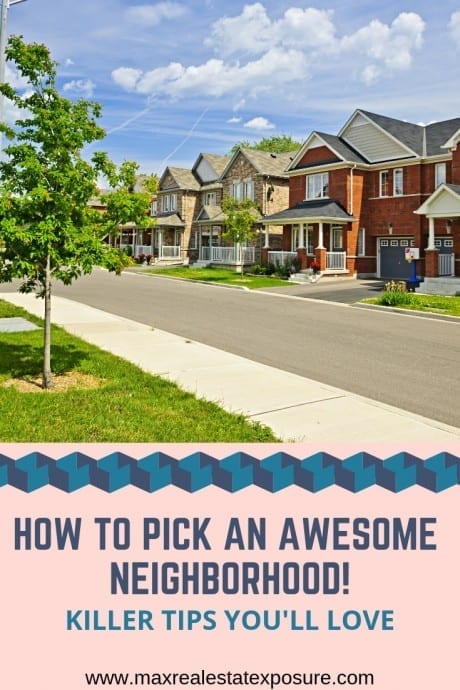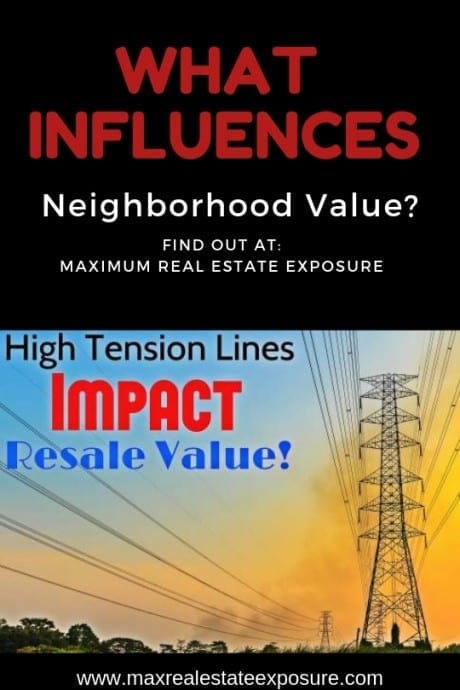 How do I know the neighborhood is good? Are there types of neighborhoods I should be considering?
How do I know the neighborhood is good? Are there types of neighborhoods I should be considering?
These are great questions when trying to find a neighborhood you’ll enjoy.
Understanding how to choose a neighborhood is an essential consideration for home buyers.
The process of buying a home can be fascinating.
Imagining you and your family living in a new, better space where you can enjoy yourselves is motivation enough to work through all the challenges of finding and buying a house.
Let’s face it – knowing how to find a neighborhood you’ll love is crucial!
When buying a home, you buy more than just a building. You are purchasing a lifestyle.
Where your home is located and the neighborhood will influence your and your family’s lives for as long as you live in that house.
This makes choosing the right neighborhood an integral part of selecting the right home. So, how do you pick an area?
When looking for a home, most people will settle on a town first and then start narrowing down some of the communities they feel best suited for their lifestyle.
Some people don’t understand that choosing your neighborhood can directly impact what you pay for a home and its long-term value.
In most communities, specific neighborhoods will have a particular “cache.”
They are well recognized as ideal for resale due to their extreme popularity. There can be any number of reasons why specific neighborhoods carry a premium over others.
A good local real estate agent should be able to point out the differences for you. Below, you will see some of the many considerations for the types of neighborhoods many buyers find appealing.
Before you start looking for a home, one of the wisest things you can do is assemble a checklist of everything you want in a neighborhood. Look over your list and then prioritize the items.
If the neighborhood is good, you will likely find many things on your checklist.
Finding The Right Neighborhood For You
When you talk with your Realtor about the homes you want to look at, each home’s neighborhood should be a primary consideration.
One of the many things a buyer’s agent does for you is point out whether a neighborhood is good. There are many types of areas.
Each will have its unique characteristics. There are always factors that go into one neighborhood being more popular than another. An excellent real estate agent can help point out these traits.
Buying a house without a Realtor can be a big mistake because many don’t know how to distinguish vital neighborhood characteristics they should. It can lead to home-buying errors.
Here are a few things you will want to consider when looking into areas. Some of these factors will be a positive influence, while others will not.
Finding a neighborhood will be more straightforward when you factor in these things.
Schools Play an Essential Role
Schools are a big deal when it comes to real estate prices. A sound school system can drive property values and insulate them against market fluctuations.
However, this also means you can expect to pay a premium for a home in an excellent school district. The quality of nearby schools is an essential consideration for any home buyer.
If you have children or plan on having them, you will naturally want them to access the best education possible. But even if you have no plans to have children, the quality of the nearby schools will still affect your property values.
If you don’t have kids and schools are not necessary, be sure you understand you will almost always pay more property tax assessments in areas where the schools are top-notch.
You’ll find the assessed values of homes strongly correlate with excellent schools.
One thing worth noting is that some cities and towns have different school districts.
This means the neighborhood’s location can affect where your kids go to school. This is one reason some areas can command more money than others in the exact location.
It’s a good idea to ensure your chosen neighborhood is in the school district you want for your kids.
Low Crime and Safety Make a Good Place to Live In
 Everyone wants to live in a safe neighborhood. However, depending on your budget and the city you want to live in, you may not have the option of living in the safest community in your town.
Everyone wants to live in a safe neighborhood. However, depending on your budget and the city you want to live in, you may not have the option of living in the safest community in your town.
However, there are varying degrees of safety. Just because a home is not in the top neighborhood does not mean it is genuinely dangerous.
You have a variety of options to examine the security of a neighborhood. There are websites where you can type in the address and see the crime history near the home.
One excellent site for this information is Neighborhood Scout. Neighborhood Scout checks the safety history of crime for almost every city and town in America.
The site will also compare the neighborhood you are considering to other communities nationwide so you can make informed decisions based on your family’s needs.
Searching methods include the overall crime rate, property crime rate, crimes per square mile, and violent crime rate.
You can also talk to your Realtor about a given neighborhood. Another good option is talking to your potential neighbors to understand how safe they feel. Do your research so you are not surprised after you move into your new home.
One thing many homebuyers fail to think about until it is too late is knowing if there is a sex offender nearby. Make sure you check before making an offer on a home.
You can lose your earnest money deposit if you back out after the due diligence period.
Sidewalks and Street Lighting Can Be Helpful
These things often go hand in hand with safety. Most people love to have sidewalks and well-lit areas for their kids to be safe. While not having sidewalks isn’t the end of the world, it is a nice feature.
Without a doubt, lighting and sidewalks enhance neighborhood appeal to those who have children.
Access to Highways Enhance The Types of Neighborhoods Buyers Love
Some neighborhoods are just easier to get to than others. Easy access to the highway allows you to get across town and even out of the city, which is much more accessible than if you don’t have road access.
This can be a double-edged sword, though. Specific neighborhoods are located in high-traffic areas because they have good highway access. You will probably want highway access if you commute daily to work.
If you work from home, this might not be as important. Either way, highway accessibility is a consideration when choosing a neighborhood.
Working as a real estate agent for the past thirty-seven years, more buyers have put highway access at the top of their wish list.
Major Conveniences Help Establish if a Neighborhood is Good
The proximity to restaurants, shopping, and grocery stores can make an area very appealing to individual home buyers.
The easier it is to get to this stuff, the less time you will need to spend in a car. If you are a commuter for work, this can be especially important.
After an hour in the car getting home from work, do you want to take a 20-minute drive to get groceries? The ease with which you can get to major shopping and restaurants is always a significant consideration among home buyers.
All things being equal, if you are in a town where one neighborhood is 5 minutes away from conveniences and another is 20 minutes away, the neighborhood with a shorter commute almost always comes out on top.
As a Realtor, this is one of the top questions I get from buyers relocating to the area. They want to know how far they must go for a good restaurant and when to grab milk and bread on a whim.
Walkability Makes It Good For Many Home Buyers
 Walkability indicates how easy it is to enjoy your neighborhood without a car. Can you walk to the nearest grocery store, restaurant, or bar?
Walkability indicates how easy it is to enjoy your neighborhood without a car. Can you walk to the nearest grocery store, restaurant, or bar?
This is becoming a central selling point for many people as they avoid driving everywhere.
Walking feels good, relieves stress, and gives young people options that they wouldn’t otherwise have. Homes in the heart of the city will naturally have more excellent walkability than those in the country.
However, newer developments are focusing on increasing walkability as a selling point. If this is important to you, you can probably find a home that offers good access to the things you want on foot.
Are you looking to research how quickly you can walk to significant conveniences in your city or town? Take a look at the excellent website known as Walk Score. Walk Score has graded most neighborhoods nationwide, which is a terrific tool.
Access to a Commuter Rail is a Popular Feature
While being next to train tracks is usually not a favorable location, on the flip side, it is having access to a train for commuting purposes.
Accessing the Boston commuter rail is a significant benefit here in my area of Massachusetts. There will always be those people who despise fighting the early morning and late afternoon rush hour commute.
Locating where you can get easy access to a train can be a significant benefit. Franklin, Massachusetts, and Southborough, Massachusetts, are two trendy towns in my area for many home buyers because they can access the train to Boston.
Without the train, the commute can quickly approach an hour at high-volume traffic times.
How is The Nightlife?
Does the neighborhood offer you easy access to the nightlife in the area? Some home buyers like to experience their city’s nightlife and want a home that provides this.
Ideally, the neighborhood will be within walking distance or offer mass transit options to enjoy the bars and clubs safely without driving.
If you are out in the suburbs, this may not even be on your radar, but some buyers see this as an attraction if you are looking in the city.
Are There Parks and Playgrounds in The Area?
Adults and children alike need access to green space periodically. If you have children, you will want a neighborhood with a playground nearby.
Even if you do not have kids, walking in the park or with the dog in a natural environment is still lovely. Often, buyers gravitate toward being located in the center of town.
Not only for the ease with which they can access most conveniences but also for enjoying the natural beauty that a town common or park may offer.
Bad Neighbors Can Ruin a Good Neighborhood
This one may sound funny, but it is a good idea to research the neighbors directly near the property you are considering.
It doesn’t mean you need to stake the place out, but the last thing you want is to get stuck living next to a lousy neighbor you will have to deal with. They are the type of people who can make selling your home harder.
Real Estate agents can usually pick up on whether or not there is an issue next door that could cause a resale problem. You can also check in with the local police department to see if any of the surrounding properties have had disturbances that may concern you.
Having a Dog Park Nearby Can Be a Beneficial Feature
For dog owners, this is an important consideration. Dogs have so much energy that it is essential to let them run off-leash on occasion.
In most cities and towns, this can only be done legally in prescribed areas. If you have a dog, you probably want access to an off-leash park within a reasonable distance. This is part of my advice with my tips for moving with pets.
Having Churches and Synagogues Nearby is a Popular Amenity
Those home buyers who hold religion as an essential part of their life and culture like to know where the nearest church and synagogue are located. This could be a significant consideration for how some choose a neighborhood.
What Makes Areas Less Desirable?
 While most buyers strive to find a good neighborhood, some are not fortunate enough to be as picky based on their budget.
While most buyers strive to find a good neighborhood, some are not fortunate enough to be as picky based on their budget.
Some factors can negatively influence the popularity of neighborhoods.
Let’s have a look.
Railroad Tracks Nearby Can Be Detrimental
Railroad tracks nearby mean you can potentially expect to listen to freight trains or commuter rail at all hours. The closer you are to the tracks, the louder the noise.
If you have ever been near a train as it blasts its horn while traveling through the city, you have a good idea of how loud it can be around railroad tracks.
When railroad tracks are close to a home you are considering purchasing; it is always a good idea to find the train’s schedule.
It might be a nonissue, as the train could pass by the home most of the time at work or on other occasions where it won’t bother you all that much.
Checking on the train’s schedule should be something you check with the owner and ask your real estate agent to verify.
Your agent also should be able to give you a handle on how much the tracks will affect the home’s saleability in the future.
High Tension Lines Abutting a Subdivision Lowers Its Appeal
You may find a home in a neighborhood that is a real bargain. The only issue is that it’s located next to major power lines.
This could be a great deal, but there are reasons why the home is so cheap. Some people are concerned about the health risks of being so close to the electromagnetic output from high-tension lines.
There are conflicting opinions on whether high-tension power lines affect our health. Others don’t like looking out their window at giant power line towers. Let’s face it: they are ugly.
This will be a consideration for some buyers when choosing a neighborhood. It is another issue you will want to keep regarding resale value in the back of your mind.
Highway Noise Will Impact Home Values
Like the noise from railroad tracks, the noise from nearby highways can be a real drawback for potential home buyers. Even with the considerable sound barriers many cities use, road noise can be off-putting for many.
It is also a problem for home values. Most homes near the highway will be less valuable than those farther away. Like railroad tracks, you can expect the noise to be an issue day and night.
Sometimes, people will settle for living near a highway because they can typically get much more bang for their buck in a home. Just be sure to realize when it comes time to sell your home, you will also feel it in your wallet.
Location is critical to a home’s market value, and homes abutting highways typically suffer.
Here is a comprehensive list of what brings down a property value. Keep these things in mind when choosing a neighborhood.
Is There an Association?
Whether you are buying a condo or a house, finding out if there is a homeowner’s association is essential. With an HOA, you will be bound by the restrictive covenants with the neighborhood.
A condominium association will tend to have more rules and regulations than a single-family neighborhood. This is due to the fact there are usually more common areas.
Some buyers love that a neighborhood has rules and regulations, while others will not care for them.
It is wise to find out whatever side of the fence you’re on.
What Makes a Good Neighborhood?
There is no single factor that makes a neighborhood good. There are many factors we have discussed that make areas desirable. Everyone has their own opinion on why they choose one community over another.
How Many Houses Are There?
There is no set number of homes that defines a neighborhood. A neighborhood could have a cul-de-sac with a couple of houses or be a large subdivision with hundreds of homes.
Finding a neighborhood is easier when you know what type you want.
Secondary Considerations For Choosing The Right Area
There are a few other things that may or may not weigh on your mind when trying to choose an appropriate neighborhood. These are what I would consider secondary considerations, although, for you, they may be priorities.
- Being close to a library.
- Easy access to a local YMCA.
- Close to a significant gym such as Golds.
- A Starbucks or Dunkin Donuts is nearby.
- A state park or lake.
- The beach.
Final Thoughts
How to choose a neighborhood for your home search is an essential consideration. Make an appropriate offer when you have located a property you love.
Have your real estate agent run the real estate comps so you know what’s a good offer. Hopefully, you now have a handle on what to think about.
Finding a neighborhood is always easier when you know what to look for.
Other Resources on Selecting a Neighborhood
- What are the questions before choosing a condominium neighborhood – Maximum Real Estate Exposure shares valuable information on what to find out before moving into a condo development.
Use these additional resources to help you choose the best neighborhood for you and your family!
About the author: Bill Gassett, a nationally recognized leader in his field, provided the above Real Estate information on finding a neighborhood: How to choose the right one. Bill can be reached via email at billgassett@remaxexec.com or by phone at 508-625-0191. Bill has helped people move in and out of Metrowest towns for the last 37+ Years.
Are you thinking of selling your home? I am passionate about Real Estate and love sharing my marketing expertise!
I service Real Estate sales in the following Metrowest MA towns: Ashland, Bellingham, Douglas, Framingham, Franklin, Grafton, Holliston, Hopkinton, Hopedale, Medway, Mendon, Milford, Millbury, Millville, Natick, Northborough, Northbridge, Shrewsbury, Southborough, Sutton, Wayland, Westborough, Whitinsville, Worcester, Upton, and Uxbridge MA.

